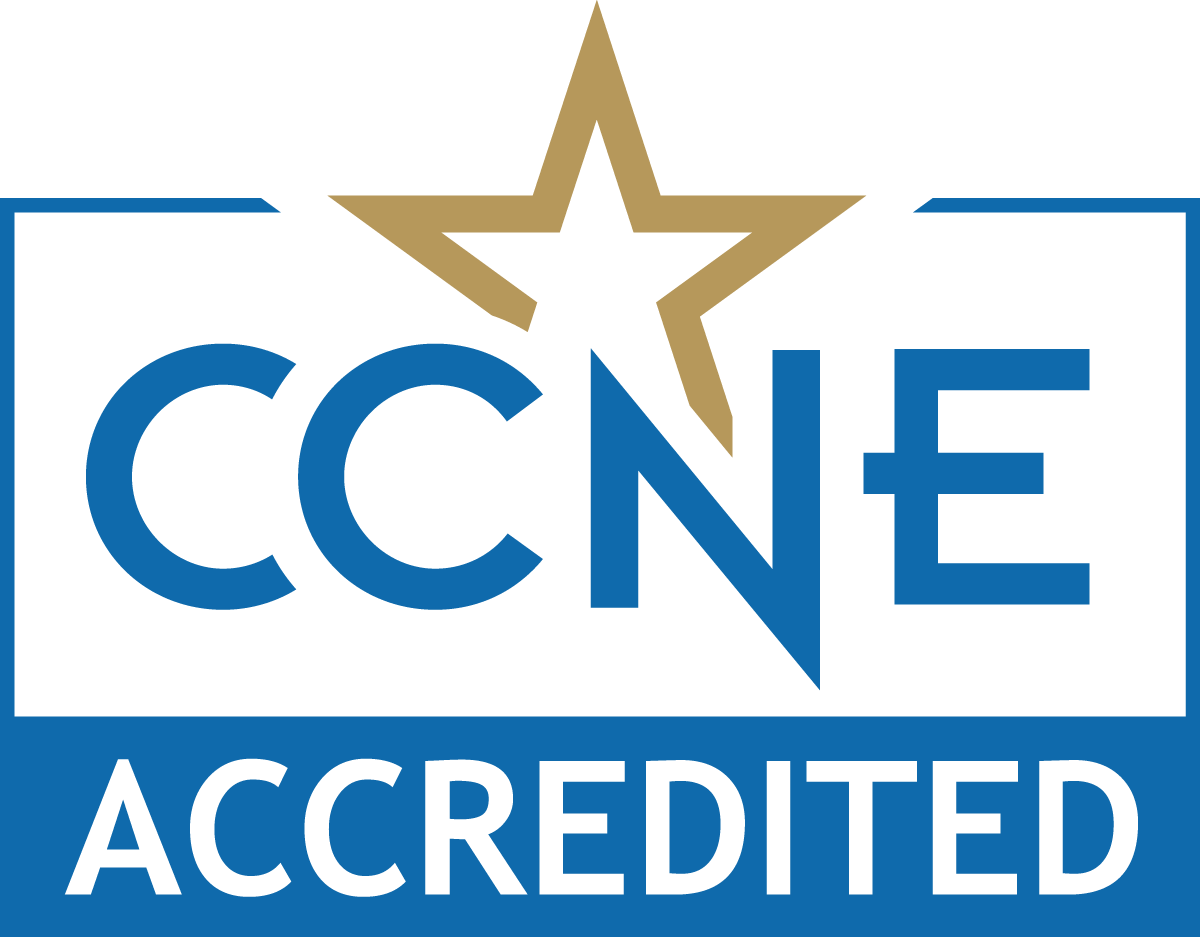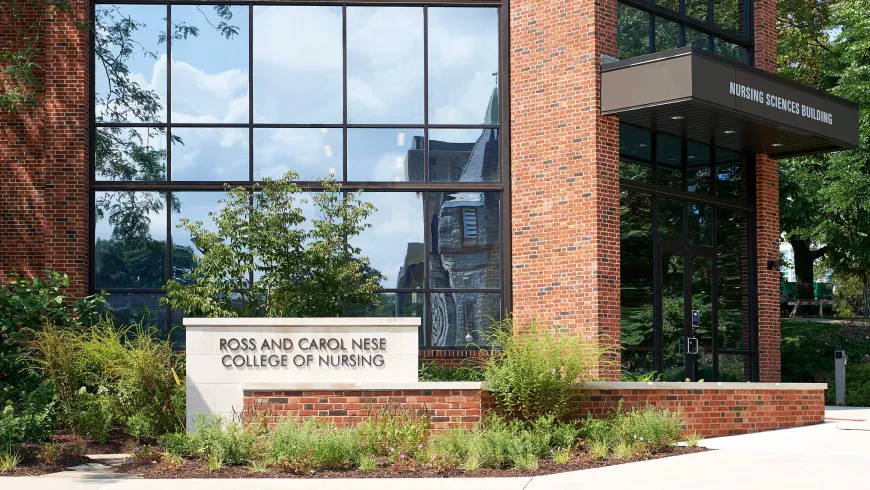Clinical Practicum
Gain hands-on experience where you live
Application deadline
Credits and costs
CCNE Accredited

Gain Expert Nursing Skills to Improve Health Care Outcomes with a DNP Degree
Lead change through transformational leadership to improve health and healthcare outcomes.
Analyze data and promote the translation of research into practice to deliver expert nursing care.
Provide inter-professional leadership within an increasingly complex health care delivery system.
Use information systems and technology to support and improve patient care and health care systems.
Shape health policy and systems of health care in the local, regional, state, national, and international forums.
Perform independently at the most advanced level of ethical specialty nursing practice.
Your Online DNP – Leadership Courses
Your Online DNP – Leadership Courses
The Doctor of Nursing Practice degree coursework focuses on the translation of research into practice, transformational leadership, and advanced expert nursing practice. It will also include nursing/change theory, foundations of advanced nursing practice, health policy, informatics, and population-based health.
The curriculum is built on the DNP Essentials developed by the American Association of Colleges of Nursing. Based on your previous education and nursing experience, the DNP–Leadership degree has two entry pathways:
- post–Bachelor of Science in Nursing for nurse administrators
- post–Master of Science in Nursing for nurse administrators and advanced practice nurses
Total credits required will vary depending on your educational background and the number of practicum hours you need to meet the requirement.
- MSN to DNP entry pathway: 38–46 credits
- BS to DNP entry pathway: 61 credits
To properly prepare for the highest level of clinical nursing practice, you will be required to attend in-person intensive sessions and complete other doctoral benchmarks, including your Qualifying Examination, Comprehensive Examination, and DNP project with an oral presentation.
As a student in the online DNP–Leadership program, you can expect to take at least two courses per semester in fall and spring, with additional courses offered during the summer semester. Students entering through the B.S. to DNP pathway will be considered full-time students and can expect to take at least three courses per semester in fall and spring.
DNP–Leadership Entry Options
The online Doctor of Nursing Practice – Leadership (DNP–Leadership) program has two entry options:
- MSN to DNP — Curriculum will be composed of five components for a total of 38–46 credits. (Your total number of credits will depend on the number of practicum hours you need to meet the 1,000-hour requirement.)
- DNP core courses: 15 credits
- Other required courses: 17 credits
- Advanced practice clinical: 0–8 credits (The number of required credits depends on the number of hours completed in your MSN program; if you have completed 550 hours, additional clinical practice hours are not required.)
- DNP project requirement: 6 credits (minimum)
- B.S. to DNP — Curriculum will be composed of seven components for a total of 61 credits.
- Master's core courses: 9 credits
- Nurse administrator option courses: 13 credits
- DNP core courses: 12 credits
- Other required courses: 14 credits
- Advanced practice clinical: 4 credits (needed to meet the 1,000-hour requirement)
- DNP project requirement: 6 credits (minimum)
- Electives: 3 credits
Practicum Hours
A total of 1,000 hours of post–B.S. practicum are required in the DNP–Leadership program. You may transfer 550 hours of practicum (if applicable) from the master's program. The remaining hours are accomplished through various courses in the DNP curriculum that include practicum hours as part of the course work. Practicum hour plans will be developed in consultation with the course faculty member and with the approval of the DNP faculty adviser. Development of the plans for practicum experiences begins with your admission to the program. The practicum planning process involves establishing a site affiliation agreement with the practicum site and identifying a preceptor(s). You will be responsible for identifying potential practicum sites and preceptors and working with the Assistant Dean for Online Education and Outreach at the Ross and Carol Nese College of Nursing to accomplish the affiliation agreement process. Some students choose to complete practicum requirements at their place of employment and other students identify alternate practicum sites.
MSN to DNP Curriculum
DNP Core Courses (15 credits)
- 3credits
Examines the relationship of nursing theories to the development of nursing science, as well as current scientific advances that guide nursing practice and research.
- 3credits
Evaluation and translation of evidence-based research into nursing practice.
- Prerequisite
NURS 830
- 3credits
Doctor of Nursing Practice transformational leadership to improve healthcare delivery and quality outcomes.
- 3credits
Doctor of Nursing Practice transformational leadership to improve healthcare delivery and quality outcomes.
- Prerequisite
NURS 832
- 3credits
The Doctor of Nursing Practice (DNP) project plan will be developed focusing on design, sample, data collection, projected outcomes, resourcing, plan for analysis, and sustainability. Students will collaborate with key stakeholders to build project support. Students will complete steps for Institutional Review Board (IRB) submission. The course includes 75 hours of required clinical practicum hours.
- Prerequisite
NURS 830, NURS 831
Other Required Courses (17 credits)
- 1credit
Continuing seminars which consist of a series of individual lectures by faculty, students, or outside speakers.
- 1credit
Provides the theoretical and practical knowledge needed to design and conduct ethically responsible social and behavioral health research.
- Prerequisite
Master of science degree
- 3credits
This course explores population health concepts, measurement, and application in practice, research, and policy. This course explores population health as a framework for improving health in society. Multiple determinants will be examined in relation to health status measurement, health and disease trends, and health disparities at a community, national, and global perspective.
- 3credits
This course provides a foundation in information systems and technology for improvement of health care.
- 3credits
Concepts of health care economics and policy for nurse administrators.
- 3credits
Develops research and quantitative methods related to the design and analysis of epidemiological (mostly observational) studies. Such studies assess the health and disease status of one or more human populations or identify factors associated with health and disease status. To a lesser degree, the course also covers non-randomized, intervention (experimental) studies that may be designed and analyzed with epidemiological methods.
- 3credits
Investigates methods for assessing data collected from experimental and/or observational studies in various research settings.
DNP Project (6 credits)
- 2credits
The Doctor of Nursing Practice project demonstrates clinical scholarship in an area of practice.
- Prerequisite
NURS 831
- Note
This course will be repeated three times for a total of 6 credits.
Master's Core Courses (9 credits)
- 3credits
Analysis and evaluation of the health care system with emphasis on health policy and economic issues affecting nursing practice.
- 3credits
Current conceptual and theoretical models in nursing, including relationship to practice and research in development of nursing science.
- 3credits
Examines the relationship of nursing theories to the development of nursing science, as well as current scientific advances that guide nursing practice and research.
Nurse Administrator Option Courses (13 credits)
- 3credits
Concepts of health care economics and policy for nurse administrators.
- 3credits
Concepts and theories of leadership for nurse administrators.
- 3credits
Human resource management and workforce issues for nurse administrators.
- Prerequisite
NURS 846
- 4credits
Practicum in the application of the nurse administrator role in health care settings.
- Prerequisite
NURS 845; NURS 846; NURS 847
DNP Core Courses (12 credits)
- 3credits
Evaluation and translation of evidence-based research into nursing practice.
- Prerequisite
NURS 830
- 3credits
Doctor of Nursing Practice transformational leadership to improve healthcare delivery and quality outcomes.
- Prerequisite
NURS 831
- 3credits
Doctor of Nursing Practice transformational leadership to improve healthcare delivery and quality outcomes.
- Prerequisite
NURS 832
- 3credits
The Doctor of Nursing Practice (DNP) project plan will be developed focusing on design, sample, data collection, projected outcomes, resourcing, plan for analysis, and sustainability. Students will collaborate with key stakeholders to build project support. Students will complete steps for Institutional Review Board (IRB) submission. The course includes 75 hours of required clinical practicum hours.
- Prerequisite
NURS 830, NURS 831
Other Required Courses (14 credits)
- 1credit
Continuing seminars which consist of a series of individual lectures by faculty, students, or outside speakers.
- 1credit
Provides the theoretical and practical knowledge needed to design and conduct ethically responsible social and behavioral health research.
- Prerequisite
Master of science degree
- 3credits
This course explores population health concepts, measurement, and application in practice, research, and policy. This course explores population health as a framework for improving health in society. Multiple determinants will be examined in relation to health status measurement, health and disease trends, and health disparities at a community, national, and global perspective.
- 3credits
This course provides a foundation in information systems and technology for improvement of health care.
- 3credits
Develops research and quantitative methods related to the design and analysis of epidemiological (mostly observational) studies. Such studies assess the health and disease status of one or more human populations or identify factors associated with health and disease status. To a lesser degree, the course also covers non-randomized, intervention (experimental) studies that may be designed and analyzed with epidemiological methods.
- 3credits
Investigates methods for assessing data collected from experimental and/or observational studies in various research settings.
Advanced Practice Clinical (3-4 credits)
- 1-4credits
The focus of the clinical practicum is planning, implementing, and evaluating evidence-based interventions to address a healthcare problem.
- Note
1–4 credits per semester (maximum of 8 credits)
DNP Project (6 credits)
- 2credits
The Doctor of Nursing Practice project demonstrates clinical scholarship in an area of practice.
- Prerequisite
NURS 831
- Note
This course will be repeated three times for a total of 6 credits.
Electives (3 credits)
Students can choose from a diverse list of online courses preselected by the program to satisfy this requirement.
DNP Project
The DNP project is an important aspect of the program. You and your advising team will meet prior to the beginning of the first semester to begin planning your DNP project. Project identification and development progress along with coursework will align with evidenced-based practice and quality improvement initiatives. You will present project related presentations at varying points during the program. Please see the Benchmarks section for more details. The culmination of the program is an evidence-based practice project. The goal of the DNP project is to produce an actual, deliverable product that has originated from practice experience. You will identify a problem and use evidence-based research to develop a proposal to implement and evaluate a practice change initiative.
Course Availability
If you're ready to see when your courses will be offered, visit our public LionPATH course search (opens in new window) to start planning ahead.
Advance Your Nursing Career

Advance Your Nursing Career
The DNP degree prepares nurses for the highest level of clinical nursing practice. You can use the knowledge gained from this program and the support of Penn State career resources to become a nurse leader in a variety of capacities, depending on your goals.
Job Titles Related to This Degree
The following roles are often held by people with this type of degree:
- Nurse Practitioner (NP)
- Nursing Director
- Nursing Instructor
Employment Outlook for Occupational Fields Related to This Degree
Estimates of employment growth and total employment are provided by the U.S. Bureau of Labor Statistics and are subject to change. While these occupations are often pursued by graduates with this degree, individual outcomes may vary depending on a variety of factors. Penn State World Campus cannot guarantee employment in a given occupation.
Medical and Health Services Managers
Nurse Practitioners
Nursing Instructors and Teachers, Postsecondary
Career Services to Set You Up for Success

From the day you're accepted as a student, you can access resources and tools provided by Penn State World Campus Career Services to further your career. These resources are beneficial whether you're searching for a job or advancing in an established career.
- Opportunities to connect with employers
- Career counselor/coach support
- Occupation and salary information
- Internships
- Graduate school resources
Ready to Learn More?
Get the resources you need to make informed decisions about your education. Request information on this program and other programs of interest by completing this form.
Ready to take the next step toward your Penn State doctorate?
Costs and Financial Aid
Costs and Financial Aid
Learn about this program's tuition, fees, scholarship opportunities, grants, payment options, and military benefits.
Costs and Financial Aid
Graduate Tuition
Graduate tuition is calculated based on the number of credits for which you register. Tuition is due shortly after each semester begins and rates are assessed every semester of enrollment.
2025–26 Academic Year Rates
| How many credits do you plan to take per semester? | Cost |
|---|---|
| 11 or fewer | $1,037 per credit |
| 12 or more | $12,448 per semester |
Financial Aid and Military Benefits
Some students may qualify for financial aid. Take the time to research financial aid, scholarships, and payment options as you prepare to apply. Federal financial aid may only be used to pay for credits used to satisfy program requirements.
Military service members, veterans, and their spouses or dependents should explore these potential military education benefits and financial aid opportunities, as well.
Additional Cost of Attendance Details
To view the detailed list of cost of attendance elements:
- visit the Tuition Information site
- click the plus sign to expand the table
- select a semester from the World Campus row
Technical Requirements
Review the technical requirements for this program.
Who Should Apply?
If you’d like to update your knowledge and skills to meet the demands of the constantly changing health care field or if you’re a nurse who plans to continue in a practice role and who has already earned a bachelor's or master's degree in nursing, this DNP online degree program may be right for you.
Doctoral Benchmarks
Doctoral Benchmarks
Learn about the benchmarks that you will be required to reach during the course of the Doctor of Nursing Practice program.
During the course of the Doctor of Nursing Practice (DNP) program, you will be required to reach certain benchmarks similar to those of a resident doctoral student: Qualifying Examination, Comprehensive Examination, and a Final Oral Presentation. Your doctoral committee will support you, monitor your progress, and evaluate your performance throughout the program.
Benchmarks
Qualifying Examination Portfolio
The qualifying portfolio review for DNP students will be used to evaluate your past performance and potential for successfully completing the program. Your portfolio will include:
- narrative statement/career goals
- unofficial transcripts of all graduate study at Penn State completed prior to examination
- DNP project plan
Comprehensive Examination
The comprehensive examination will mark your progression into your DNP project after the completion of appropriate course work. You will submit a written project proposal to your doctoral committee and do an oral presentation of your proposal at an in-person intensive session. Your proposal will include letters of support from the agency where you plan to implement your DNP project.
Final Oral Presentation
The final oral presentation marks your completion of the program and is administered by your doctoral committee. You will work closely with your faculty advisers throughout the program to successfully develop and implement your DNP project.
You will not be required to come to Penn State for this final presentation. The presentation will be done synchronously using video streaming technology. In addition, the public will be invited to view the presentation along with the doctoral committee. The public oral presentation of the project will be followed by a private session of questions and responses.
Intensive Sessions for the DNP–Leadership Program
Although your courses are online, you will be required to attend two separate in-person intensive sessions at the Penn State University Park campus or Penn State Milton S. Hershey Medical Center during the program. These intensive sessions will provide you with the opportunity to interact in person with your doctoral committee, other faculty, and fellow students.
You will work closely with your academic adviser to determine your exact plan of study, but for full-time students, you can expect to meet in-person at the following times based on your pathway.
| Session | When |
|---|---|
| Intensive I (Orientation) | 3 days in August of Semester 1 |
| Intensive II (Comprehensive Examinations) | 4 days in February of Semester 2 |
| Session | When |
|---|---|
| Intensive I (Orientation) | 3 days in August of Semester 3 |
| Intensive II (Comprehensive Examinations) | 4 days in February of Semester 4 |
Orientation
The Ross and Carol Nese College of Nursing will conduct an orientation to the DNP program. The purpose of the orientation is to help you become familiar with the program details and your academic advising team and to begin to identify a DNP project based on your area of interest.
College of Nursing Accreditation
College of Nursing Accreditation
The Ross and Carol Nese College of Nursing is approved by the Pennsylvania State Board of Nursing.
The baccalaureate degree program in nursing, master’s degree program in nursing, Doctor of Nursing Practice program, and post-graduate APRN certificate programs at The Pennsylvania State University are accredited by the Commission on Collegiate Nursing Education, 655 K Street NW, Suite 750, Washington, DC 20001, 202-887-6791. Further information can be found at ccneaccreditation.org.
The Ross and Carol Nese College of Nursing has been designated a Center of Excellence by the National League for Nursing in recognition of the college’s work creating and sustaining environments that promote the pedagogical expertise of the faculty.
Set Your Own Pace

Set Your Own Pace
Whether you are looking to finish your program as quickly as possible or balance your studies with your busy life, Penn State World Campus can help you achieve your education goals. Many students take one or two courses per semester.
Our online courses typically follow a 12- to 15-week semester cycle, and there are three semesters per year (spring, summer, and fall). If you plan to take a heavy course load, you should expect your course work to be your primary focus and discuss your schedule with your academic adviser.
The MSN to DNP pathway usually takes two years of full-time or three years of part-time study (minimum of two courses/semester with higher credits with practicum courses). The BSN to DNP pathway is offered full-time only and generally takes eight semesters over three years.
A Trusted Leader in Online Education

Penn State has a history of more than 100 years of distance education, and World Campus has been a leader in online learning for more than two decades. Our online learning environment offers the same quality education that our students experience on campus.
Convenient Online Format
This program's convenient online format gives you the flexibility you need to study around your busy schedule. You can skip the lengthy commute without sacrificing the quality of your education and prepare yourself for more rewarding career opportunities without leaving your home.
How to Apply to Penn State

How to Apply to Penn State
Apply by October 1 to start January 12
Application Instructions
Deadlines and Important Dates
Complete your application and submit all required materials by the appropriate deadline. Your deadline will depend on the semester you plan to start your courses.
Spring Deadline
Apply by October 1 to start January 12
Steps to Apply
The decision to pursue the Doctor of Nursing Practice (DNP) is a serious one. It is highly recommended that you contact the program office to discuss your potential program of study with the program team prior to submitting your application. The online DNP program will be a rigorous, competitive program, and you should thoroughly understand the level of time and commitment that will be expected of you through the course of your studies.
Applicants must hold a bachelor's degree in nursing from a U.S. regionally accredited institution or a postsecondary degree in nursing that is equivalent to a U.S. baccalaureate degree earned from an officially recognized degree-granting international institution. Students entering from the post-master's route must have earned a master's degree with a major in nursing from a program accredited by a national accrediting agency for nursing.
Applicants to the DNP–Leadership program must also have a current license to practice professional nursing in at least one state in the United States or a foreign country. You are also expected to have a grade-point average (on a 4.0 scale) meeting the requirements for your track:
- BS to DNP: cumulative undergraduate GPA ≥ 3.5 and B+ or better on subsequent course work
- MSN to DNP: cumulative graduate GPA ≥ 3.5 and B+ or better on subsequent course work
Applications are submitted electronically and include a nonrefundable application fee.
You will need to upload the following items as part of your application:
A copy of an official transcript from each institution attended, regardless of the number of credits or semesters completed. Transcripts not in English must be accompanied by a certified translation. Penn State alumni do not need to request transcripts for credits earned at Penn State, but must list Penn State as part of your academic history. Upon admission and your acceptance of admission, you will be asked to send an additional official transcript. You will receive instructions at that time.
Statement of Purpose — You should submit a personal statement not to exceed 300 words, which should describe your relevant work experience; clearly articulated reasons for applying to the selected option; long-term goals or career aspirations; and other information that may be useful to the admissions committee.
English Proficiency — The language of instruction at Penn State is English. With some exceptions, international applicants must take and submit scores for the Test of English as a Foreign Language (TOEFL) or International English Language Testing System (IELTS). Minimum test scores and exceptions are found in the English Proficiency section on the J. Jeffrey and Ann Marie Fox Graduate School's "Requirements for Graduate Admission" page. Visit the TOEFL website for testing information. Penn State's institutional code is 2660.
Please note that for entrance into a Penn State Ross and Carol Nese College of Nursing graduate-level program, the minimum acceptable score for the TOEFL is 580 for the paper-based test, or a total score of 80 with a 25 on the speaking section for the Internet-based test (iBT). The minimum composite score for the IELTS is 7.0.
References (3) — Obtained from academic and professional perspectives. If you completed college-level courses over the last five years, an academic reference is required. Other references should be from a nursing supervisor, preferably holding a degree higher than yours. You will need to initiate the referral process through the online application by entering names, email addresses and mailing addresses of three references. Upon submission of your application, those individuals will each receive an email asking them to complete a brief online recommendation specifically regarding your commitment to the health care profession and potential for success in an online program. Please inform all references that they must submit the form for your application to be complete.
Program-Specific Questions/Materials
Vita — Listing your professional experience and other qualifications
Writing Sample — A published or unpublished scientific paper, thesis, or other scholarly writing sample
Interview — You will be asked to participate in an interview, via Internet-based video conferencing or in-person
To begin the online application, you will need a Penn State account.
Create a New Penn State Account
If you have any problems during this process, contact an admissions counselor at [email protected].
Please note: Former Penn State students may not need to complete the admissions application or create a new Penn State account. Please visit our Returning Students page for instructions.
You can begin your online application at any time. Your progress within the online application system will be saved as you go, allowing you to return at any point as you gather additional information and required materials.
- Choose Enrollment Type: "Degree Admission"
- Choose "WORLD CAMPUS" as the campus
Checking Your Status
You can check the status of your application by using the same login information established for the online application form.5. Complete the application.
Admissions Help
If you have questions about the admissions process, contact an admissions counselor at [email protected].
Contact Us

Contact Us
Have questions or want more information? We're happy to talk.
To learn more about the Doctor of Nursing Practice – Leadership (DNP–Leadership) program, please contact:
World Campus Admissions Counselors
Phone: 814-863-5386
Email: [email protected]
Cody Hoffman
Student Enrollment Recruiter
Penn State Ross and Carol Nese College of Nursing
Phone: 814-865-0865
Email: [email protected]
Learn from the Best
Learn from the Best
The online DNP program is offered through Penn State World Campus in collaboration with the highly respected Penn State Ross and Carol Nese College of Nursing. Our courses are taught by distinguished faculty who have special training and experience teaching in an online environment.
Faculty
Dr. Diane Berish, Ph.D.
- DegreePh.D., Miami University
- DegreeM.A., University of Virginia
- DegreeB.A., University of Notre Dame
Dr. Diane Berish is an assistant research professor. Her research interests include statistics and research methods, long-term services support, aging and health care policy, and health care quality. Dr. Berish works with students to find the best methods to understand their DNP projects.
Dr. Barbara Birriel, Ph.D., ACNP-BC, FCCM
- DegreePh.D., Penn State
- DegreePost-grad certificate ACNP, University of Pennsylvania
- DegreeMSN, Thomas Jefferson University
- DegreeBSN, Bloomsbury State College (University)
Dr. Barbara Birriel is an assistant research professor and an acute care nurse practitioner. Her research interests include ethics for the practitioner, palliative care, and family caregiving experiences in heart failure patients.
Kristen Bransby, CRNP, CPNP-PC
- DegreeDNP, University of Maryland
- DegreeMSN, Pediatric Nurse Practitioner, Primary Care Track, Drexel University
- DegreeB.S., Nursing, Penn State
Dr. Kristen Brandsby, associate teaching professor, is a doctoral-prepared pediatric nurse practitioner and pediatric mental health specialist who teaches the pediatric course work in the family nurse practitioner track and mentors and facilitates learning for the DNP students. Her practice interests include adolescents, pediatric mental health, health policy, and concussions.
Cara Exten, PH.D., MPH, B.S.
- DegreePh.D., The Ohio State University
- DegreeMPH, Emory University
- DegreeB.S., East Tennessee State University
Dr. Cara Exten is an assistant teaching professor for the Ross and Carol Nese College of Nursing. She is an infectious disease epidemiologist, focusing on health disparities affecting sexual and gender minority populations, with an emphasis on sexual health (specifically HIV and other sexually transmitted infections) and substance use. She has extensive experience in survey data collection, data analysis, and working with high-risk populations, and she is passionate about the examination of diseases in their entirety, including biological, sociological, and epidemiological factors.
Donna M. Fick, RN, FGSA, FAAN
- DegreePh.D., Nursing Science/Geriatrics, University of California-San Francisco
- DegreeMSN, Gerontological Nursing, University of Cincinnati
- DegreeBSN, Nursing Science, Berea College
Dr. Donna M. Fick is the director of the Center of Geriatric Nursing Excellence at Penn State. She is an instructor for a variety of graduate nursing courses. Dr. Fick's research interests include inappropriate medication use in older adults, recognition and management of delirium superimposed on dementia, and implementation of ultra-brief delirium screening in hospital settings.
Sharilee Hrabovsky, D.Ed.
- DegreeD.Ed., Adult Education, Penn State
- DegreePost-master’s certification, Family Practice Nurse Practitioner, Widener University
- DegreeMSN, Villanova University
- DegreeBSN, Thomas Jefferson University
Dr. Sharilee Hrabovsky is an assistant research professor with the College of Nursing. She teaches online courses in the graduate school. She has been a practicing nurse for the last 36 years, 23 of them as a nurse practitioner, and has presented on tobacco use, treatment, and regulation research for the last eight years. She is a nationally certified tobacco treatment specialist and has worked with hundreds of tobacco users through clinical trials or direct patient care in their quest to reduce or quit tobacco use.
Judith E. Hupcey, CRNP, FAAN
- DegreeEd.D., Nursing Education, Columbia University Teachers College
- DegreeM.Ed., Nursing Education, Columbia University Teachers College
- DegreeM.S., Adult Nurse Practitioner, Columbia University School of Nursing
- DegreeBSN, Columbia University School of Nursing
Dr. Judith E. Hupcey, professor of nursing, medicine, and bioethics, is the associate dean for graduate education and research in the College of Nursing. She is also a fellow in the American Academy of Nursing. Her research focuses on persons with heart failure at the end of life and their family caregivers. She recently completed a study investigating the palliative care needs of persons with heart failure and their family caregivers. From this study, a cutting-edge model of palliative care for heart failure was developed.
Susan Leight, Ed.D., ARPN-BC, NP-C, ANP-BC, FAANP, FAAN
- DegreePostdoctoral Fellow, University of Pennsylvania
- DegreeResearch Fellow, University of Pennsylvania
- DegreeEd.D., West Virginia University
- DegreeMSN, West Virginia University
- DegreeBSN, State University of New York at Buffalo
Dr. Susan Leight is the director of the NP programs, the WE Lead program, and innovation at the College of Nursing. Dr Leight’s research interests include vulnerable populations, focusing on rural health and women’s health. She also spends time in Central America providing care for the underserved.
Sheri Matter, Ph.D., MSN, RN
- DegreePh.D., Leadership and Administration, Indiana University of Pennsylvania
- DegreeMSN, Wilmington University
- DegreeMBA, University of St. Francis
- DegreeMHA, University of St. Francis
- DegreeB.S., Nursing, Wilkes University
Dr. Sheri Matter is the assistant dean of graduate professional programs and is an associate teaching professor in the College of Nursing. She has more than 30 years of nursing leadership, including as chief nursing executive of a multiple-hospital system. Dr. Matter's research for her dissertation focused on the nurse characteristics of a highly reliable organization.
Madeline Mattern, DNP, FNP-C, CNE
- DegreeDNP, Carlow University
- DegreePost-Masters FNP Certificate, Penn State
- DegreeM.S., Penn State
- DegreeB.S., Penn State
- DegreeRN Diploma, Citizen’s General Hospital School of Nursing
Dr. Madeline Mattern is the director of nurse practitioner options and an assistant teaching professor for the College of Nursing. Her dissertation focused on current management strategies of Pennsylvania primary care nurse practitioners for persons diagnosed with Generalized Anxiety Disorder. Her research interests include reducing anxiolytic use in primary care and primary care of underserved and rural populations.
Dr. Susan Maynard, DNP, M.S., RN-BC, CCNS, CCRN-K
- DegreeDNP, Penn State
- DegreeM.S., University of California, San Francisco
- DegreeBSN, Penn State
Dr. Susan Maynard is an assistant teaching professor and the clinical placement coordinator for the graduate professional programs. Her research interests include stroke systems of care, rural health disparities, community health partnerships, and quality improvement in health care.
Brandi Peachey, DNP, FNP-BC, RN
- DegreeDNP, Penn State
- DegreeBSN, West Virginia University
Dr. Brandi Peachey is an assistant teaching professor in both the graduate and undergraduate programs. She is an FNP who practices in pediatrics. Dr. Peachey’s interests include adolescent substance abuse and screening techniques.
Nicole Peterson, DNP, A/GPCNP-BC, CRNP, RN
- DegreeDNP, University of Iowa
- DegreeMSN, University of Iowa
- DegreeBSN, University of Iowa
Dr. Nicole Peterson is an assistant teaching professor and emeritus associate professor of instruction at the University of Iowa. She has been an adult and gerontological primary care nurse practitioner since 2008, with clinical practice experience in long-term care, community care, home care, and primary care. This includes providing geriatric and primary care to the Meskwaki Nation community (Sac & Fox Tribe of the Mississippi in Iowa and their employees). She has teaching experience in undergraduate and graduate nursing, including master’s and doctorate levels, as well as serving as a geriatric nurse practitioner.
Britney Wardecker, PH.D.
DegreePh.D., Psychology, University of MichiganDr. Britney Wardecker is an assistant professor for the Penn State Ross and Carol Nese College of Nursing and a faculty affiliate for the Penn State Center for Healthy Aging. Prior to her faculty position, Dr. Wardecker began training (funded by the National Institutes of Health) as a Postdoctoral Fellow in the Center. Her research examines lesbian, gay, bisexual, transgender, and queer (LGBTQ) older adults' psychological and physical health outcomes. She also loves to teach in the areas of health, discrimination, health disparities, and research methods. Her research interests include promoting health equity for lesbian, gay, bisexual, and transgender (LGBT) older adults; examining health disparities and individual differences in health (such as age, gender, and sexual orientation); and biomarker measurement.
Beth Ann White, DNP, CRNP-BC, RN
- DegreeDNP, Penn State
- DegreeM.S. and Adult Nurse Practitioner, Penn State
- DegreeB.S., Nursing, Penn State
- DegreeRN, Diploma, Geisinger School of Nursing
Dr. Beth Ann White is the coordinator for the FNP program and is an associate teaching professor in the College of Nursing. She has worked as a case manager, disease manager, and regional manager for the Medical Home project, along with her continued practice as an adult nurse practitioner. Her research interest includes improved oral care in long-term care.
Kelly Wolgast, RN, FACHE, FAAN
- DegreeDNP, University of Alabama
- DegreeM.S., Strategic Studies, U.S. Army War College
- DegreeMSN, Vanderbilt University
- DegreeBSN, Penn State
Dr. Kelly Wolgast is the assistant dean for outreach and professional development and an associate teaching professor. She teaches both nurse administrator/management courses and nurse educator courses in Penn State's MSN and DNP programs. Her research interests include nurse leadership, health care delivery models, distance learning, and military/veterans' health.
Andrea Yevchak Sillner, Ph.D., CNS, RN
- DegreePh.D., Nursing, Penn State
- DegreeM.S., Nursing, Penn State
- DegreeB.S., Nursing, Penn State
Dr. Andrea Yevchak Sillner is an assistant research professor in the College of Nursing. She is also a board-certified gerontological clinical nurse specialist. Dr. Sillner's research interests are in improving transitions of care for older adults and their informal family caregivers by focusing on technology-assisted communication and preferences of care.
Mariya Tankimovich, DNP, CRNP, FNP-C, CNE
- DegreeDNP, University of Texas Health Science Center
- DegreeMSN, University of Texas Health Science Center
- DegreeBSN, University of Texas Health Science Center
- DegreeB.A., University of California
Dr. Mariya Tankimovich is the director of the DNP program and an associate teaching professor for the Penn State Ross and Carol Nese College of Nursing. Her practice improvement project is Implementation Plan of a Family Clinic–Based Pilot Study for a Smartphone-Based Short Message System Text-Messaging Intervention to Improve Dietary Practices among Adult Patients with Hyperlipidemia. Her DNP Fellowship Project was Connection to Care: Perceptions, Readmission, and Reality — a research project to study unwanted readmissions of pediatric patients at Texas Children’s Hospital in Houston and to design and implement a plan to reduce such unwanted readmissions. Her research interests include health promotion and disease prevention, improving patient outcomes, and transitions-of-care challenges.
Kimberly Van Haitsma, PH.D.
- DegreePh.D., Clinical Psychology, Bowling Green State University
- DegreeM.A., Clinical Psychology, Bowling Green State University
- DegreeB.A., Psychology, Calvin College
Dr. Kimberly Van Haitsma's research interests include developing observational methodologies to assess behavior and emotion in dementia, developing evidence-based education programs to enhance the skills of formal caregivers, advancing the understanding of person-centered care — "knowing preferences for everyday living" — and developing measurement tools for research, clinical practice, and evidence-based interventions for formal caregivers.
Sheilah Yohn, DNP, AGNP-BC, RN
DegreeDNP, Wilkes UniversityDr. Sheilah Yohn is an assistant teaching professor. She is a practicing NP in a family care setting. Dr. Yohn’s interests are in providing care to the underserved.
News



